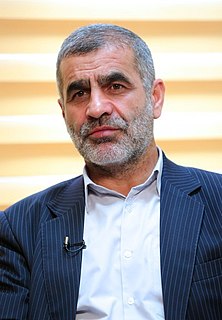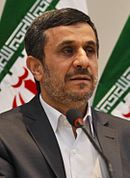Related Research Articles
Mahmoud Ahmadinejad was President of Iran from 3 August 2005 to 3 August 2013, and during that time had repeatedly made contentious speeches and statements against Israel. Ahmadinejad refused to call Israel by name, instead calling it the “Zionist regime”. He has called for the "elimination of the Zionist regime". Ahmadinejad took part in a protest called "The World Without Zionism" and has derided Israel on numerous occasions. He has urged regional powers to cut diplomatic and economic ties with Israel and halt oil sales. Tensions have risen over Iran's nuclear program. He has also provided funding, training and arms to what are widely regarded as terrorist organisations Hezbollah and Hamas, which are sworn enemies of Israel and waged war against Israel.

Mohammad Reza Rahimi is an Iranian politician who served as the fifth first vice president from 13 September 2009 until 3 August 2013. His previous posts included governor of the Kurdistan province and vice president for parliamentary affairs.

Gholam-Hossein Elham is an Iranian conservative and principlist politician who held several posts during the term of the former President Mahmoud Ahmedinejad.

Mahmoud Ahmadinejad, born Mahmoud Sabbaghian, is an Iranian conservative politician who served as the sixth president of Iran from 2005 to 2013. He was known for his hardliner views and nuclearisation of Iran. He was also the main political leader of the Alliance of Builders of Islamic Iran, a coalition of conservative political groups in the country, and served as mayor of Tehran from 2003 to 2005, reversing many of his predecessor's reforms.

Iran–Venezuela relations have strengthened substantially in recent years. "Iran and Venezuela are two friendly and united states which pave their ways to further progress and welfare for their nations", according to President Rouhani. The two countries are contemporary strategic allies.

Presidential elections were held in Iran on 12 June 2009, with incumbent Mahmoud Ahmadinejad running against three challengers. The next morning the Islamic Republic News Agency, Iran's news agency, announced that with two-thirds of the votes counted, Ahmadinejad had won the election with 62% of the votes cast, and that Mir-Hossein Mousavi had received 34% of the votes cast. There were large irregularities in the results and people were surprised by them, which resulted in protests of millions of Iranians, across every Iranian city and around the world and the emergence of the opposition Iranian Green Movement.

Ali Akbar Salehi is an Iranian academic, diplomat and former head of the Atomic Energy Organization of Iran, who served in this position from 2009 to 2010 and also from 2013 to 2021. He served for the first time as head of the AEOI from 2009 to 2010 and was appointed to the post for a second time on 16 August 2013. Before the appointment of his latter position, he was foreign affairs minister from 2010 to 2013. He was also the Iranian representative in the International Atomic Energy Agency from 1998 to 2003.

Esfandiar Rahim Mashaei is an Iranian conservative politician and former intelligence officer. As a senior Cabinet member in the administration of President Mahmoud Ahmadinejad, he served as Chief of Staff from 2009 to 2013, and served as the fourth first vice president of Iran for one week in 2009 until his resignation was ordered by Supreme Leader Ayatollah Ali Khamenei.

The Cabinet of Iran is a formal body composed of government officials, ministers, chosen and led by a President. Its composition must be approved by a vote in the Parliament. According to the Constitution of the Islamic Republic of Iran, the President may dismiss members of the cabinet, but must do so in writing, and new appointees must again be approved by the Parliament. The cabinet meets weekly on Saturdays in Tehran. There may be additional meetings if circumstances require it. The president chairs the meetings. The Supreme Leader has the power to dismiss cabinet members like ministers and vice presidents, as well as the President, at any time, regardless of the Parliament's decisions.
Hamid Behbahani is an Iranian academic and politician who served as minister of roads and transportation from 2 August 2008 to 1 February 2011 when he was impeached by the Parliament of Iran.

Heydar Moslehi is an Iranian cleric and politician who served as the minister of intelligence from 2009 to 2013.

Masoud Mir Kazemi is an Iranian conservative politician and the current Vice President of Iran and head of Plan and Budget Organization. He was a member of the Parliament of Iran from Tehran district from 2012 until 2016, and also previously served at two ministerial posts in the cabinet of Mahmoud Ahmadinejad.

The Presidency of Mahmoud Ahmadinejad consists of the 9th and 10th governments of the Islamic Republic of Iran. Ahmadinejad's government began in August 2005 after his election as the 6th president of Iran and continued after his re-election in 2009. Ahmadinejad left office in August 2013 at the end of his second term. His administration was succeeded by the 11th government, led by Hassan Rouhani.

The foreign policy of the Mahmoud Ahmadinejad administration was the policy initiatives towards other states by the former President of Iran, as different from past and also future of the Iranian foreign policy. Ahmadinejad's tenure as president came at a time of greater conflict, rhetorical or physical, than his predecessors. In following this there were various measures, external or internal, that led to his policy changes. This was primarily a division between relations with states of the Western world and the rest of the world.

Ali Nikzad is an Iranian conservative politician and academic and a former cabinet minister.

Abdolreza Sheykholeslami is an Iranian politician who is the former Minister of Cooperatives, Labour and Social Welfare. Before that, he was the Minister of Labour and Social Affairs in the second cabinet of Mahmoud Ahmadinejad from 2009 to 2011. He was dismissed from office on 3 February 2013, being the ninth minister to be fired during the second term of president Mahmoud Ahmedinejad since 2009.

Mohammad Hosseini is an Iranian politician who served as minister of culture in the second cabinet of Mahmoud Ahmadinejad. He is also a military figure and the veteran of the Iran–Iraq War. He is part of the Mahmoud Ahmedinejad's close circle. He is the vice president for parliamentary affairs in the cabinet of Ebrahim Raisi.

Asadollah Abbasi is an Iranian conservative politician who currently serves as the governor of Gilan Province, since October 2021.

Ghana–Iran relations refers to the current and historical relationship between Ghana and Iran. Ghana has an embassy in Tehran, Iran, and Iran has an embassy in Ghana.
The "Deviant current" or "Current of deviation" is a term used by Iranian officials and conservative rivals of Mahmoud Ahmadinejad to describe Ahmadinejad's entourage which functions like a faction or party. Ahmadinejad had some tendency toward Iranian nationalism which deviated from the clerics' theocratic rule, hence top clerics labeled the faction associated with him as "deviant current".
References
- ↑ "Ahmadinejad to build university in Iran". United Press International. 28 July 2013. Retrieved 2 August 2013.
